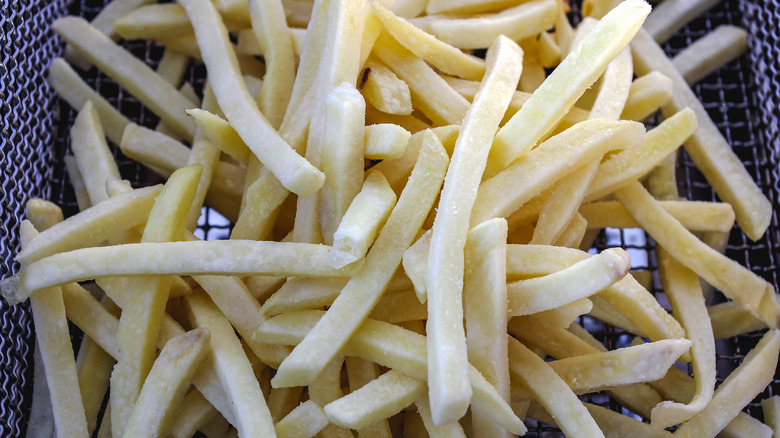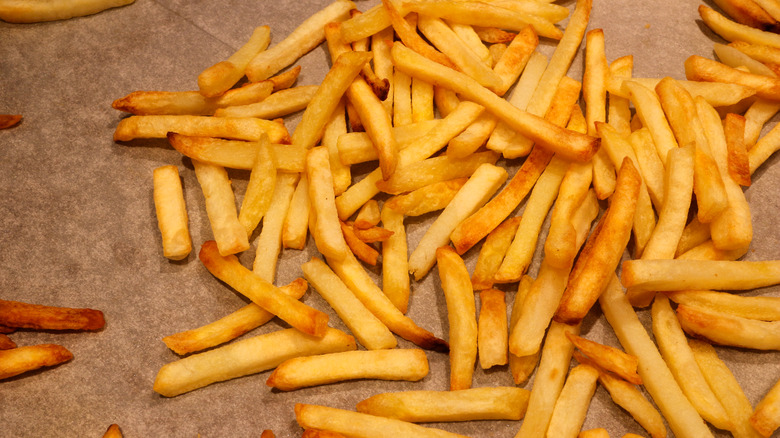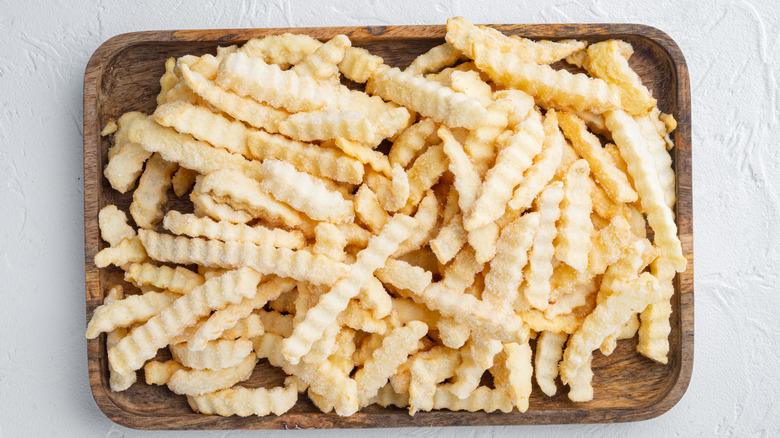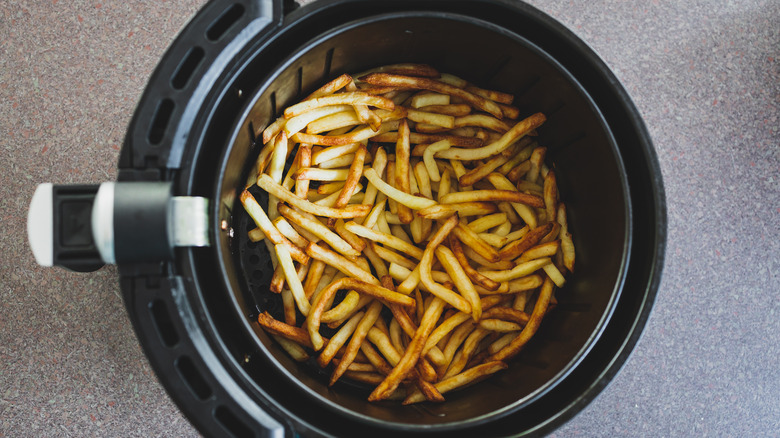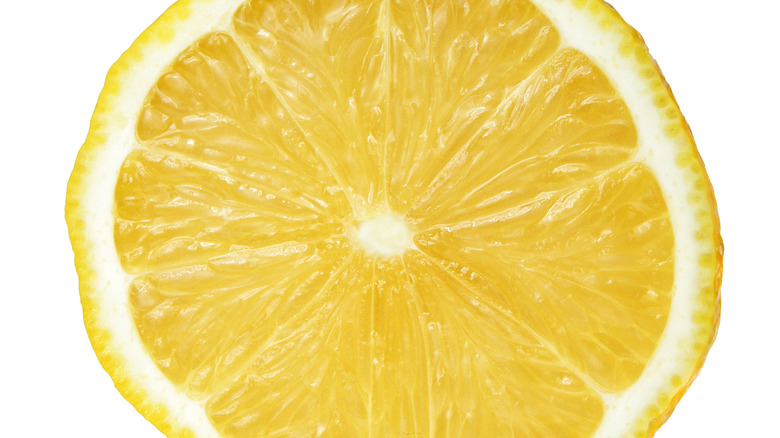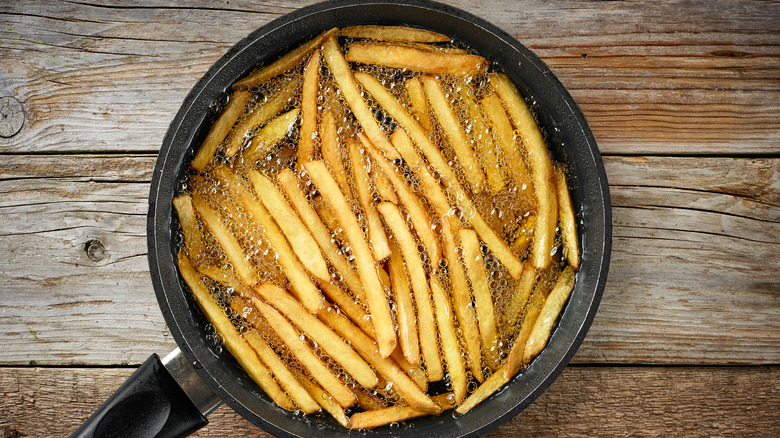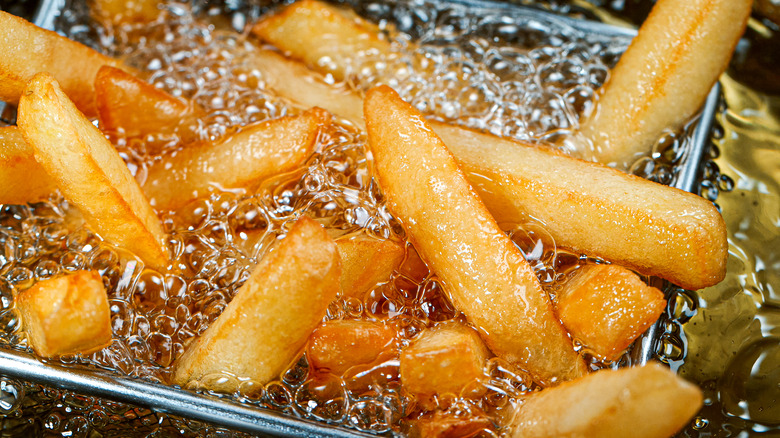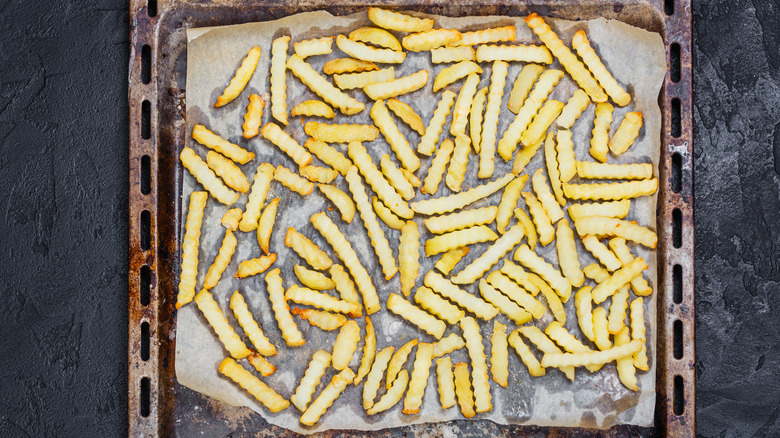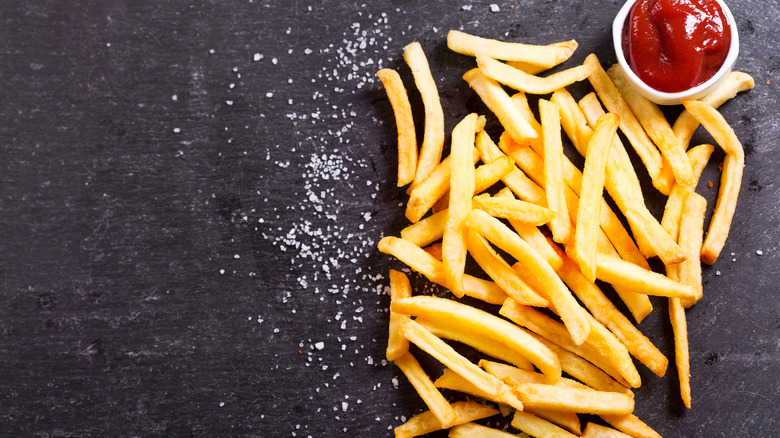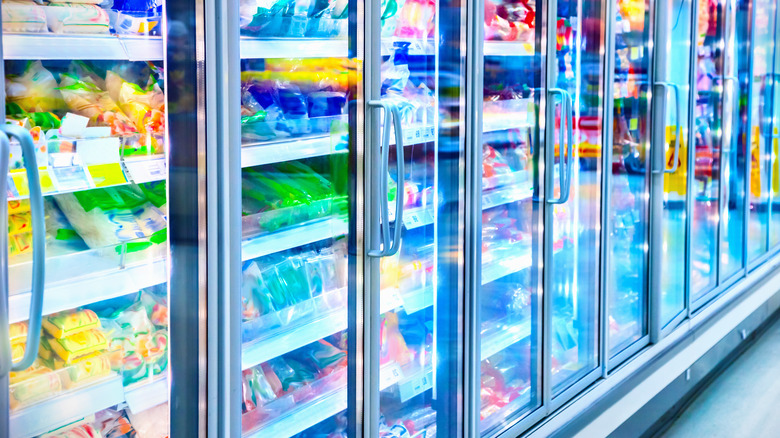Ways You're Messing Up Your Frozen French Fries
If you've ever struggled with recreating the magic of restaurant french fries in your own kitchen, you are far from alone — especially when you're giving it a go with store-bought frozen fries. It can be really challenging to achieve that perfect ratio of crispy exterior and fluffy interior, and while opinions may vary on the best fry cut (crinkle, shoestring, steak, etc.), most people would agree, there is nothing worse than a soggy french fry. Oh, and this just in: fries from a restaurant do not reheat well at home.
Whether you're using the oven, an air fryer, or a deep fryer, there are a lot of simple tweaks you can make in the cooking process that might vastly improve the taste of those frozen fries. So if you do want to take on the culinary mission of making them on your own at home, keep reading to learn some common mistakes you can avoid in order to ensure the tastiest fries possible, even if they start rock solid and cold in a bag.
Cooking the fries on a baking sheet
You know how sometimes frozen pizza cooking instructions will suggest cooking the pizza directly on the oven rack if you want a crispier crust? Well, the same goes for frozen french fries. You have two options: either place a cooling rack on top of a baking sheet (or sort of nestled in) so there is space between the surface of the rack and the base of the pan (which you should line with tin foil or parchment for easier cleanup and less potential for fries sticking), or just cook the fries directly on the cooling rack. If you go with the latter approach, you can always place a pan at the bottom of the oven to catch any grease drippings from the rack.
According to Epicurious, cooking the fries on a rack as opposed to directly on the baking sheet makes space for more air circulation, and gives the moisture released from the fries somewhere to go besides pooling underneath the fry, potentially making it wet. The moisture instead drops into the pan which, in turn, creates steam, and this helps ensure even crisping and browning on all sides of the fry. It's fried potato magic.
Letting the fries thaw before you cook them
There's some conflicting information out there regarding whether frozen fries should be thawed before you cook them. A lot of fry enthusiasts let those frozen delicacies start softening up on the counter for a while before they hit any sort of heat source.
In general, when it comes to frozen french fry cooking methods, we prefer to trust the potato country's unofficial potato experts. According to The Idaho Potato Commission, while you technically can let a frozen french fry thaw out before cooking it, it's not the ideal scenario. The potatoes cook faster when thawed but if they're still in a completely frozen state when they hit the heat, the fry's surface remains sealed as it cooks, which yields a crispier, this-is-what-a-french-fry-should-always-taste-like final product.
The same goes for baking or air frying the fries. Get everything heated, prepped, and ready, before you put that cold bag on the counter, so there isn't too long of a lag between when you remove the fries from the freezer and when they start the cooking process.
Not using an air fryer to cook the fries
If you've got one of the best cooking inventions of our time at your disposal, we highly recommend using it to cook frozen fries. We're talking about the air fryer, a marvelous invention that doesn't technically fry food but definitely does a great job of mimicking that crispy, crunchy essence we search for in fried foods.
If you cook frozen fries in an air fryer, as opposed to the oven, there is a greater chance the entire surface of the fry will get cooked due to the design of the air fryer, which features an effective heating element and a fan that quickly circulates air within the chamber and around the items in the basket. The result is all around crispier fries that don't require much added oil — just a spritz of cooking spray on the basket of the air fryer and the fries, and some shaking of the basket halfway through the cooking process.
Skipping the addition of an acidic ingredient on the fries
It's the universal truth that french fries are nothing without a generous sprinkling of salt. The salt is a crucial component to the perfect french fry. Having said that, if you are using frozen fries that are plain and not pre-seasoned, it might be worth adding an acidic component as part of your seasoning too, in addition to salt.
While you might assume that salt is a sufficient seasoning all on its own, an acidic ingredient like lemon juice, for example, combined in a very small dose with the oil used to cook the fries, can bring out the flavor and potentially keep the fries from browning too much, according to The Washington Post. Vinegar is another acidic ingredient that can bring out the best in french fries, just ask the Brits. Tomatoes are an acidic food, which might explain why ketchup is such a delicious accompaniment to fries.
All we're saying is, adding a small dose of something acidic in the prep of the frozen fries, could mean the fries truly reaching their potential... or you can just make sure to have plenty of ketchup.
Not utilizing the best techniques with the cooking oil
Oil can play a small or large part of the cooking process with frozen fries. If you're cooking the frozen french fries in the oven, your instinct might be to dump the fries onto a baking sheet, and douse some oil on them, then use your hands or a spatula to try and evenly coat the fries, like you would for maybe a sheet pan of veggies with olive oil. Unfortunately, this is not the best method for oil coating when it comes to frozen french fries.
A better option is to use a bag to coat the fries and to spray, not pour, the oil on the fries once they're in the bag. This method not only creates a more even coating of the fries (when you use a plastic bag, it's almost like you're marinating them), but it also ensures you don't use too much oil. Too much oil can lead to a soggier, less crispy fry. So dump the fries into a plastic bag, spray some oil, seal the bag, then shake the fries, before you add them to the cooking sheet or rack (or basket, if you're using an air fryer).
Avoiding the deep fryer
Honestly, this might be hard to hear but, one of the biggest reasons why your store-bought frozen french fries might not taste nearly as good as the fries you order at a restaurant is that you're not using an actual deep fryer. They're called french fries for a reason. If you want legit, delicious fried potatoes you have to, well, fry them. Yes, the oil will splatter and, yes, the cleanup might be a bit gnarlier but, how badly do you want it?
We're just pointing out, you always have the option to actually dip those frozen fries into a vat of hot oil, in order to achieve the perfect flavor and texture. If you don't have a commercial or small home-friendly fryer, you can always use a sturdy pot and a thermometer designed for hot oil. According to a chef on Quora, placing a basket into the pot to fry the fries is ideal but if you don't have that, you can always use a skimmer to safely remove them once they've fried to perfection.
Not preheating the sheet pan prior to adding the fries
While oven-cooked fries might thrive on a rack placed in the sheet pan, or directly on the rack in the oven with a sheet at the bottom to catch any drippings, there is another hack for trying to achieve maximum fry crispiness directly on the sheet pan, no rack required. A pan that's piping hot prior to the fries being added to it can deliver some seriously tasty fried potatoes.
The New York Times says that by preheating the pan (at 500 degrees Fahrenheit for about 10 minutes in a perfect world) before you put the frozen fries on it, you are more likely to guarantee the fries developed a seared, crunchy outer layer that doesn't require any actual frying on your part. Tossing the potatoes halfway through the cooking time is still necessary to get an even cooking if you go this route. Just be sure to never underestimate the power of a very hot pan (and of course be safe and have your oven mitts on and ready when pulling the preheating pan out of the oven then applying the potato sticks).
Adding salt at the wrong time in the cooking process
Salt is an essential ingredient for the perfect french fry. A plain, unsalted fry would certainly still be edible but you're definitely not going to write home about it. A common misfire in the world of frozen fry preparation is assuming you need to salt the fries before you cook them. In actuality, it's best to apply the salt to the fries as soon as they emerge from the oven/deep fryer/air fryer.
In a thread regarding seasoning techniques for making french fries at home, several Redditors confirm, salting the fries as soon as they're done cooking helps the salt stick to the fries better. While it's possible your fries come pre-salted in the bag if you're nabbing them from the frozen food aisle, it never hurts to still add a dose of salt at home when you cook them, and the best time to do this is when the fries are hot out of your chosen cooking receptacle — not any time sooner.
Buying the frozen fries from a small store
You might not even consider the source of the frozen french fries as a reason why they might not be as tasty as the restaurant kind but there is some validity to the notion that where you buy the frozen fries can affect the eventual outcome of its frying. A seasoned baker and chef on Quora explains that it's important to skip the smaller corner stores or bodegas when buying frozen fries and instead "...buy your frozen french fries from a larger store that sells a lot of frozen french fries. If they are on sale in the weekly ad, even better, because they will be fresher. The store will have to get in extra stock for the advertised sale, so it is new stock." Good point!
Also, the freezers are better at bigger grocers. The Quora answer goes on to confirm, "...larger stores tend to have more efficient freezers because they can afford better equipment and maintenance." This information is simultaneously mind blowing and the most logical thing we've ever heard. The moral of this story is, support the small local businesses, but not when you're purchasing frozen french fries.
